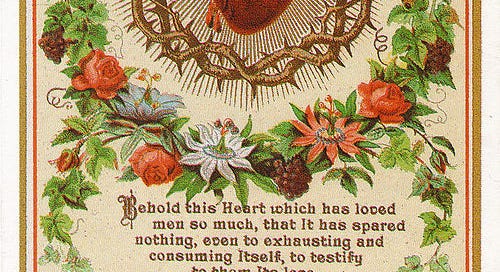Last December my husband’s grandmother, age 93, was diagnosed with terminal cancer and given a month to live, maybe two at most. She’d been living at home, independently after recovering from a bad fall and broken femur a year ago, and one of her great fears as she aged was that she would not be able to stay in her home.
Late April or so (not surprising, she is an extraordinarily strong and persistent woman) Grandma finally started needing someone to stay with her and help with unskilled nursing care. When I visited her this past Sunday, she lay on her living room couch and talked about all kinds of things — death, gratitude, hard work, and how much she didn’t like having to trouble others to do the things she did for herself until so recently. She asked me to tell the great-grandkids how proud she was of them, and that they should remain faithful in the Lord, even in times of suffering.
“You can tell them yourself, if you want. I’ll record you on my phone and send it to them.”
“I’d like that,” she agreed. So we did.
I cannot think of a more dignified end of a life. A hardworking Christian woman who has spent her whole life caring for, and providing for, and praying for her family, and spreading the Gospel within her sphere, now facing death with absolute tranquility, other than the aggravation that the Lord keeps taking His time.
***
On the other end of life, my adorable great-nephews were the ring bearers for my daughter’s wedding last summer, and they were absolutely thrilled to enter into the dignity and majesty of the moment. But let’s be clear: These are little boys. People who also get fussy and rambunctious and ask impolitic questions (not unlike nearly every great-grandmother I’ve ever known).
And yet so graciously they accepted my apology when we realized I’d forgotten to pack the decorative rings to go on the ring pillows, and solemnly they walked to the front of the church fulfilling their ceremonial role despite the absence of that last pretense of a necessary work. Their job, and they understood it, was simply to be there.
Legally all a wedding needs is a bride, a groom, a valid officiant, and two witnesses.
You can add to that a few more jobs that are real jobs, not necessary for the sacramental or legal bond, but which are valued for the work they do — lectors, musicians, photographers, the parish wedding coordinator, and so forth.
Everyone else in the massive bridal party and accompanying congregation had the dignity of doing nothing. Hangers-on. Our joyful presence was the thing that we brought, and all of us whose job was just to be there? We were each irreplaceable.
You can’t go out and hire someone from the temp agency or the wedding planning company to come “be” your college roommate or your cousin you grew up with or your neighbors who loved to see your costume every Halloween. All most of us were doing at that wedding was dressing up and sitting there, and yet we were each the one and only who could be present on our own behalf, because who we were not what we did was what made our presence meaningful.
In the same way, Great-Grandma who is not at all pleased to have other people doing for her is now in the grueling school of learning that who she is alone suffices, even when she can’t do anything much at all anymore.
***
Our dignity as human beings rests not in what we can do but in who we are. Who are we? Persons made in the image of God, made to love and be loved, know and be known.
***
The term “dignity” gets thrown around a different way, to mean an absence: Nothing yucky, unpleasant, unseemly, discouraging, painful, mind-numbing, or ego-shattering. It’s a false dignity, like a cardboard mock-up of a mansion on a theater set. It’s pretend. Life, all life, has these not-pretty parts.
Dignified little boys and dignified old women get bored when they have to do nothing. They feel pain, they feel frustration, they feel mortification when they cannot do the grown-up things they wish they didn’t need help with, but do. I don’t want to have to be taken care of like a baby. And yet who is more cherished and wanted and needed so desperately it hurts than a newborn baby?
***
What are the two most marked moments in the life of the Blessed Mother? When she carried and cared for her tiny baby, and when she abided with him in his excruciating death.
—> Fact: We tend to feel most fully “ourself” when we are providing or caring for another person who needs us — who needs our work, our company, our skills, our prayers, our humor, whatever it is we have to bring. But to be needed requires someone else to be in need.
A very old woman needs her children to care for her, and she doesn’t like it, but in fact it’s her last and perhaps greatest gift to them.
Artwork: A vintage Sacred Heart of Jesus holy card. The text reads, “Behold this Heart which has loved men so much, that it has spared nothing, even to exhausting and consuming Itself, to testify to them Its love.” Via Wikimedia, public domain.




Very wise.